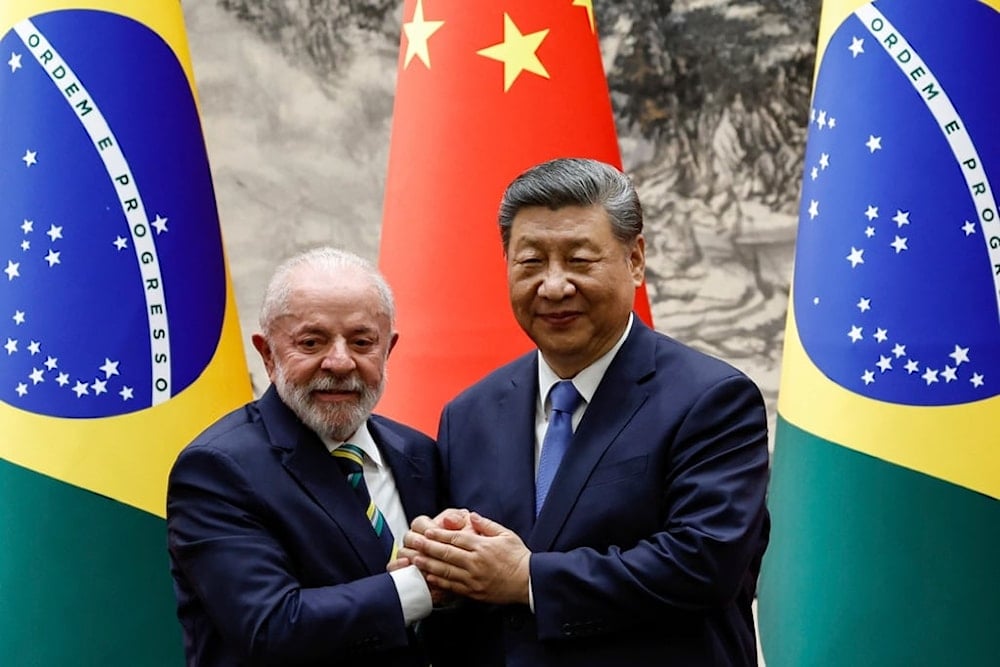Lula backs multipolar world in Beijing visit: The Guardian
Lula received full ceremonial honors in Beijing, including a military salute in Tiananmen Square, as China rolled out a diplomatic red carpet.
-

Chinese President Xi Jinping shakes hands with Brazil's President Luiz Inacio Lula da Silva after a signing ceremony and a joint press conference, at the Great Hall of the People in Beijing, China, Tuesday, May 13, 2025. (Tingshu Wang/Pool Photo via AP)
The Guardian on Saturday reported on the growing closeness between China and Brazil, underscored by a rare gesture from Chinese President Xi Jinping. Known for his typically formal demeanor, Xi shared a hug with Brazilian President Luiz Inácio Lula da Silva earlier this month, an unusual display that marked a deepening of ties between the two nations.
The embrace came after Lula's remarks at the China-CELAC forum in Beijing, where he sharply criticized US tariff policies and called for Latin America to play a central role in a "multipolar order where the Global South is duly represented." The sentiment closely aligns with Beijing's own narrative in countering Western influence, especially since Donald Trump's presidency.
While Western powers like the G7 continue to issue communiques pledging to curb global "economic imbalances", a clear jab at Beijing, China has been strategically engaging Latin American leaders who maintain strong regional sway. Among the few heads of state invited to the forum were the presidents of Brazil, Chile, and Colombia, figures seen as key to reshaping regional alliances.
Lula received full ceremonial honors in Beijing, including a military salute in Tiananmen Square, as China rolled out a diplomatic red carpet. In his keynote, Xi portrayed China and Latin America as natural partners: "Independence and autonomy are our glorious tradition. Development and revitalisation are our inherent right." He added that both sides share "a shared future."
Strategic Realignment
Brazil has been central to China's expanding economic footprint in Latin America, with bilateral trade reaching $157.5 billion in 2023. China's demand for Brazilian soybeans alone accounted for over 70% of its imports in that sector, while American exports declined. China's largest coffee chain, Luckin Coffee, has also committed to purchasing 240,000 tonnes of Brazilian coffee beans over five years, in a deal worth $1.38 billion.
"If it's up to my government, our relationship with China will be indestructible," Lula said during a business summit in Beijing. His visit concluded with the announcement of $4.5 billion in Chinese investment commitments to Brazil, spanning agriculture, nuclear energy, mining, and financial agreements like currency swaps.
Victoria Chonn-Ching, a non-resident fellow at the Atlantic Council, noted that "from a commercial point of view, the current US-China trade war has brought some export opportunities for Brazil, especially in the agricultural sector." But she cautioned that geopolitics plays a larger role: "From a geostrategic and diplomatic perspective, the US-China trade war places Brazil in a challenging position."
Read more: China, Brazil deepen trade ties with talks on railway to Peru megaport
Despite maintaining good relations with Washington, Brazil has increasingly leaned into shared positions with China. "Both countries promote multilateralism as part of their foreign policy and see themselves as having leading roles in their respective regions and in the Global South," said Chonn-Ching.
Nevertheless, Brazil has not formally joined China's Belt and Road Initiative. Lula emphasized regional sovereignty, stating that Latin America "does not want to be the stage of hegemonic disputes."
Diplomatic Pivot
Cooperation has extended into diplomacy as well. Following the start of operation Al-Aqsa Flood, Brazil drafted a UN resolution as Security Council president calling for both a humanitarian pause and the release of captives. According to the report, many believed China would block the measure. But after behind-the-scenes talks with Brazil, Beijing voted in favor. The proposal ultimately failed due to a US veto.
Read more: China renews push for Palestinian unity with new Beijing talks
Since then, China and Brazil have positioned themselves as alternative voices in global mediation efforts. The two nations issued joint statements on the Ukraine conflict that avoided directly condemning Moscow. On his return trip from China, Lula's plane stopped in Moscow, where he had a phone conversation with Xi's "best friend," Vladimir Putin.

 4 Min Read
4 Min Read










